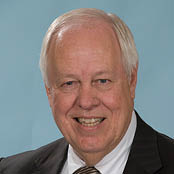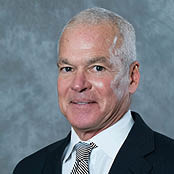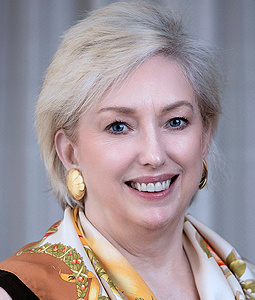
Randy Folks
Former international business department chair who started the international business program at the Moore School
Creativity and innovation have been the driving impetuses for the Moore School’s international business program. Karen Brosius, executive director of the Folks Center for International Business, talked with Randy Folks, the former department chair who started the international business program at the Moore School, along with Kendall Roth, immediate past chair and senior associate dean of international programs and partnerships, to share their insights about how the Sonoco International Business Department came to fruition.
Their leadership and ingenuity propelled the international business program to its No. 1 ranking in the U.S., according to U.S. News & World Report. The undergraduate international business program has been ranked No. 1 for more than 20 years; the International MBA program has been in the top 3 for more than 30 years.

Former international business department chair who started the international business program at the Moore School

Immediate past chair of the international business department and senior associate dean of international programs and partnerships
What was the motivation to focus on international business at the University of South
Carolina nearly 50 years ago?
Folks: The discussion around international business arose from a conversation that Jim
Kane, the business school dean in the 1970s, had with executives from several South
Carolina companies. They were having issues associated with preparing managers for
overseas operations and wondered if there was a way to get internationally savvy MBAs.
The program also helped to serve the rapidly developing group of foreign direct investors
in South Carolina and the region.
Roth: It is important to recognize that Jim supported that vision with structure as well.
He formed a faculty committee, which included Randy, that conceptualized the Master
of International Business Studies program, known as MIBS. In 1976, he established
a separate international business department with Randy as the department chair. Early
investments and unwavering support were critical in making the international business
focus a distinctive reality.
What is ground-breaking about the program and what aspects make a critical difference?
Folks: The real key to success has been the creative structures we put in place that actually
deliver the graduates that employers want. That doesn’t always happen in education!
The original MIBS program required every graduate to master a foreign language and
spend time, including an extended internship, in a country where that language was
spoken. Together with the highly rigorous interdisciplinary core courses and internationally
directed electives, our graduates had experience living and working in countries ranging
from Egypt and Germany to Brazil and China. That set us apart at the beginning from
schools that might have had just a course or two. And we concentrated our expertise
in a separate international business department, which gave us a focused group committed
to carrying out our ambitious plans.
We have maintained our influence in having our doctoral graduates place at various business schools. We took a really active role early on in the leading academic organizations and journals in international business, including the Academy of International Business, the Journal of International Business Studies, which was headquartered at the University of South Carolina for almost a decade, and the Consortium for Undergraduate Business Education to name a few.
Roth: Our international programs were initially successful because they were differentiated.
For example, MIBS was not positioned to compete head-on with the MBA market. If you
look at what we're doing today, having distinctive program designs that provide unique
international educational opportunities for students continues to be fundamental to
our success. We arguably offer the most comprehensive set of international business
programs in in the world: five undergraduate international business cohort programs,
seven Master of International Business dual-degree programs, eight international business
doctoral dual-degree programs, an executive international MBA and an international
MBA — there is nothing like it anywhere.
How has this program benefited business?
Folks: Our sweet spot at the beginning was to take people and convert them to know more
about business and international business than anybody else. They could speak the
language and had some significant overseas experience. That same value proposition
works just as well for undergrads. Corporations, particularly in the early years,
had no place else to go to find the talent we were creating. Now they come because
they found the best here.
Roth: Business obviously needs new employees with basic functional and technical skills.
However, it is interesting to also hear from employers about their desire for other
skill sets that they view critical for success, such as working in diverse team structures,
dealing with ambiguity and uncertainty, and attributes such as resilience, adaptability
and risk-taking. We rather consistently observe in our students how these latter skills
are developed, not just through our international curriculum, but by their time abroad
interfacing directly with other cultures and values systems, unfamiliar circumstances
and interpersonal encounters, differing institutional, economic and political systems,
etcetera. International programs develop competencies critical for future global managers.
What does the future hold for the program?
Roth: A key strategy we are pursuing is what I refer to as a “partner-based model” of
international education. What I mean by that is that programs are jointly designed
with other highly regarded business schools abroad, where students spend an extensive
time period at both their home and host university. This not only provides an extensive
international experience, but it also provides us the opportunity to leverage the
distinctive capabilities of our international partners. For example, with our MIB
dual-degree partner ESCP, students are able to select from more than 60 specializations
and study on ESCP campuses in Berlin, London, Madrid, Paris, Turin or Warsaw. Thus,
the partner-based model opens up a wide range of exceptional opportunities for students
through our collaborations with other world-class schools.
Folks: Creativity and innovation have always marked our efforts. Our programs are a unique combination of vision and execution; from overseas internships and collaborative cohort programs to joint- and double-degree programs with the leading business schools in the world, we have always been ahead of the curve. Thanks to our corporate partners and the current leadership, I am certain that the Moore School’s position as visionary innovators and deliverers of quality graduates will be positioned for leadership in international business for at least another 50 years.

As executive director of the Folks Center for International Business, Brosius focuses on engagement, outreach and program development with the center’s stakeholders around the world, including members of the Folks Center Global Advisory Board, business executives, policy leaders, Moore School international business alumni and donors.
Read more IB stories in the Sept. 2021 "The Edge" E-Newsletter.